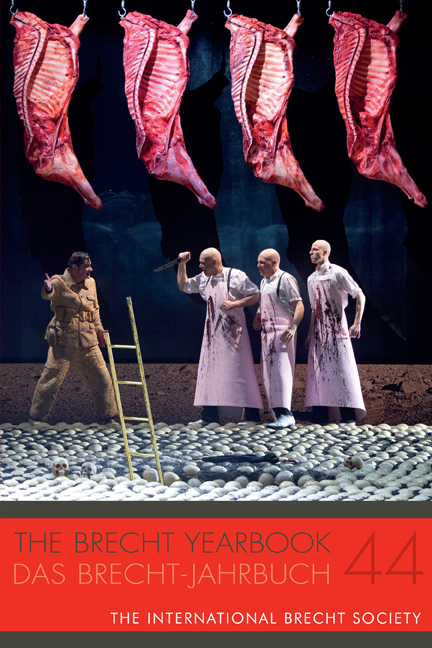Book contents
- Frontmatter
- Officers of the International Brecht Society
- Contents
- Editorial
- List of Abbreviations
- Brecht, Günter Kunert, and Edgar Lee Masters
- Brecht’s Dramatic Fragments
- Pure Joke: The Comedy of Theater since Brecht
- New Brecht Research
- Book Reviews
- Notes on the Contributors
- Now at De Gruyter Exilforschung Ein Internationales Jahrbuch
Affirmation and Alienation: The Comedy of Heiner Müller’s Hamletmaschine
Published online by Cambridge University Press: 09 February 2021
- Frontmatter
- Officers of the International Brecht Society
- Contents
- Editorial
- List of Abbreviations
- Brecht, Günter Kunert, and Edgar Lee Masters
- Brecht’s Dramatic Fragments
- Pure Joke: The Comedy of Theater since Brecht
- New Brecht Research
- Book Reviews
- Notes on the Contributors
- Now at De Gruyter Exilforschung Ein Internationales Jahrbuch
Summary
OPHELIA: Do you want to eat my heart, Hamlet. Laughs.
—Heiner Müller, Die Hamletmaschine, 548/55Heiner Müller's 1977 play Die Hamletmaschine starts with the gesture of a Western intellectual figure turning its back on the ruins of postwar Europe: “I was Hamlet. I stood on the coast and spoke with the surf BLABLA, in my back the ruins of Europe.” What kind of a beginning, and what type of an entrance is this? If entering—the stepping on stage of an actor—is the theatrical gesture par excellence, this act of Hamlet whereby he enters into appearance is at the same time an act of exiting. The actor enters the stage as the one who has been and who no longer is Hamlet: “I was Hamlet.” And instead of stepping forward and speaking to the audience, presenting himself in a relevant way, Hamlet is speaking to the surf “BLABLA” and turns his back on what he—as a critical intellectual—should be addressing.
Die Hamletmaschine can be read as an experiment exploring the possibility of theater after World War II. It explores a different type of theatricality, sometimes called postdramatic, that, following Bertolt Brecht, foregrounds and explores the precarious conditions of appearance and of theatrical presence instead of just utilizing the theatrical possibility of taking on roles and performing them on stage. Not only does it seem appropriate to read Die Hamletmaschine as such an experiment on the possibility of theater; it is, more specifically, a particularly challenging experiment on the possibility of comedic theater. It is through its peculiar comedic nature that the play exposes and explores the very conditions of theatrical presence. Against the tendency to regard Müller as a tragedian and his Hamletmaschine as a tragedy, Müller himself insisted that the play is to be understood as a comedy: “If one doesn't conceive of Die Hamletmaschine as a comedy, one will fail with this play.” As the quote suggests, comedy here is not a special, marginal genre, but somehow foundational of the theatrical play as such. Comedy in this sense is particularly tied to performance, not to drama: If one doesn't grasp The Hamletmaschine as a comedy, one will fail to come up with a convincing performance of the play.
- Type
- Chapter
- Information
- The Brecht Yearbook / Das Brecht-Jahrbuch 44 , pp. 102 - 121Publisher: Boydell & BrewerPrint publication year: 2019

